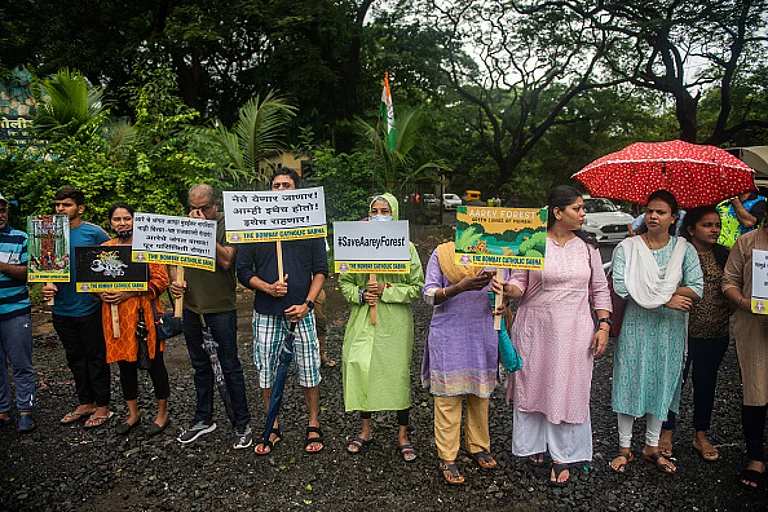The Supreme Court on Monday directed all states and union territories to act as per the definition of "forest" as laid down by the top court in the 1996 judgment in the case of TN Godavarman Thirumulpad vs Union of India – while hearing challenges to the 2023 amendments to the Forest (Conservation) Act, 1980 (FCA) that activists alleged would open up vast swathes of forest land to non-forest and human activities.
A bench comprising Chief Justice D Y Chandrachud and justices JB Pardiwala and Manoj Misra directed the state governments and union territories to follow the ‘dictionary definition’ of forests until they provide the details of the forest land within their jurisdiction to the Centre by March 31 this year.
What was the definition of ‘forest’ under the 2023 amendments to FCA Act?
The Bill passed in 2023 provided that two types of land will be under the purview of the Act: (i) land declared/notified as a forest under the Indian Forest Act, 1927 or under any other law, or (ii) land not covered in the first category but notified as a forest on or after October 25, 1980 in a government record.
Further, the Act will not apply to land changed from forest use to non-forest use on or before December 12, 1996 by any authority authorised by a state/UT, the Bill said.
However, critics and activists argued that these amendments severely narrowed down the definition of ‘forest’ as opposed to the previous version of the Act which extended legal safeguards to ‘any forest land’.
What was the previous definition of ‘forest’ that was being followed?
In December 1996, the Supreme Court in Godavarman Thirumulpad vs Union of India and others, defined ‘forest lands’ under the FCA 1980 as all forests irrespective of the nature of ownership or classification thereof.
The judgment stated: The word ‘forest’ must be understood according to its dictionary meaning. This description covers all statutorily recognised forests, whether designated as reserved, protected or otherwise. The term "forest land" will not only include "forest" as understood in the dictionary sense, but also any area recorded as forest in the Government record irrespective of the ownership.
So then why was the FCA, 1980 amended?
In March 2023, Union Environment Minister Bhupendar Yadav introduced the Forest Conservation (Amendment) Bill in the Lok Sabha. According to the Statements of Objects and Reasons for the Bill, that was passed by both Houses, the government stated that the Godavarman judgment (as it is popularly known) in 1996 widened the applicability of the FCA.
“Subsequent to the said Judgment, the provisions of the Act were applied in the recorded forest areas including such recorded forests which had already been put to various type of non-forestry use, thereby restraining the authorities from undertaking any change in the land use and allowing any development or utility related work. Besides this, apprehensions prevailed regarding applicability of the Act in the plantations raised in private and Government non-forest lands,” the statement said.
Another reason the government provided for introducing the amendments was that there was a “need to fast track the strategic and security related projects of national importance so as to ensure development of vital security infrastructures, especially along the international border areas such as Line of Actual Control, Line of Control and Left Wing Extremism affected areas” – this caused widespread concern.

In a letter to all members of parliament, more than 100 former civil servants, members of the Constitutional Conduct Group (CCG), reiterated that the tendency of liberally giving away forest land for non-forest purposes, would be further strengthened through the FCA Amendment Bill.
Providing examples of diversion of forest lands, the letter refers to how almost 90,000 hectares of forest land have been diverted for non-forest use between 2018-19 and 2022-23.
What did the Supreme Court say in the latest judgment?
Issuing a slew of directions for forest conservation in the country, the top court ruled that any fresh proposal for opening a zoo or starting a 'safari' on forest land will now require the approval of the Supreme Court.
“No Zoos/Safaris to be notified in forests lands without prior approval...any proposal for the establishment of zoo/safaris referred to in the Wildlife Protection Act 1972 owned by Govt or any authority in forest areas other than protected areas shall not be finally approved save and except with the prior permission of this court," it said.
The court further directed the Ministry of Environment, Forest and Climate Change to put all the details on “forest like area, unclassed forest land and community forest land”, which will be provided by the states and UTs, on its website by April 15.










.jpg?auto=format%2Ccompress&fit=max&format=webp&w=768&dpr=1.0)

















